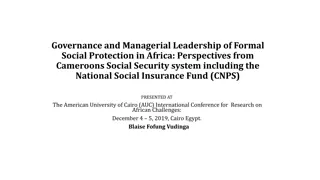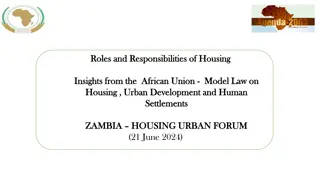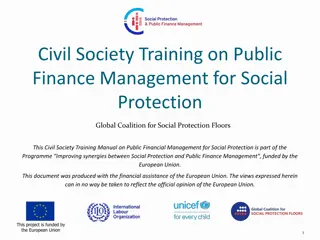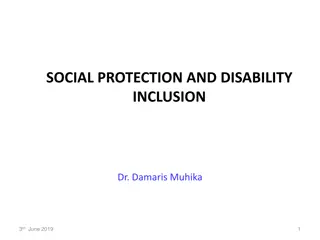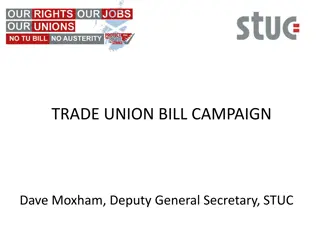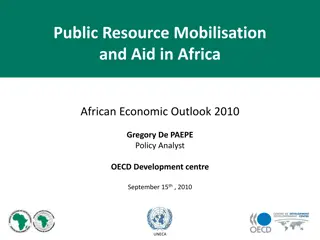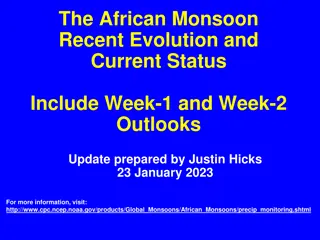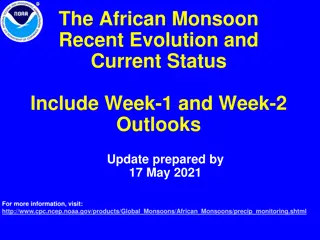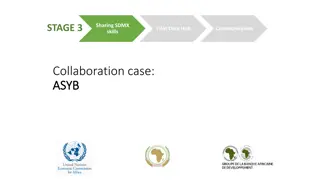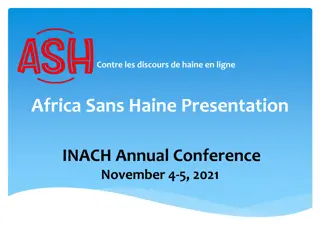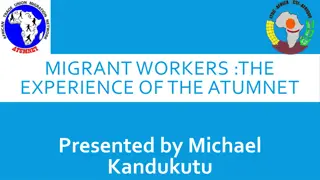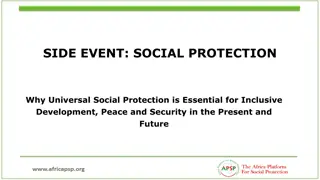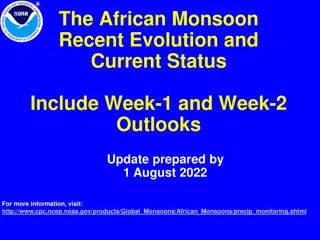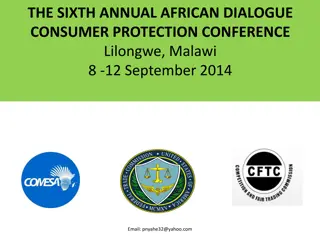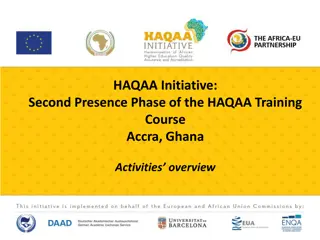The Importance of Social Protection and the African Union in Africa
Social protection is recognized as a fundamental human right, and efforts within the African Union have been made to promote social protection programs to combat poverty in Africa. The growth of social protection initiatives since the Ouagadougou declaration of 2004 has led to increased awareness and implementation of various programs across African countries, with a rising recognition of social protection as a legal right in national constitutions.
Download Presentation

Please find below an Image/Link to download the presentation.
The content on the website is provided AS IS for your information and personal use only. It may not be sold, licensed, or shared on other websites without obtaining consent from the author. Download presentation by click this link. If you encounter any issues during the download, it is possible that the publisher has removed the file from their server.
E N D
Presentation Transcript
The importance of the African Union The importance of the African Union Protocol on the Rights of Citizens to Social Protocol on the Rights of Citizens to Social Protection and Social Security in Africa Protection and Social Security in Africa Mrs Priscilla Gavi Chairperson Africa Platform for Social Protection 8thFebruary, 2023
Social Protection is a right but this has not always been recognized in Africa Social protection is a human right It is enshrined as such in many International, Continental, regional and national instruments. Starting from the the Universal Declaration of Human Rights (1948) which established the right of everyone to social security and to an adequate standard of living, to many United Nations and African Union charters, policies and protocols However, for many years, the provision of many forms of social protection have not been based on any legal basis
The growth of SP in Africa Since the Ouagadougou declaration of 2004, the AU and its partners have been working to raise awareness and knowledge regarding social protection as an important mechanism to fight poverty A lot of awareness has taken place, leading to the development of many new social protection programmes and the expansion of those already in existence Recent reviews indicate that nearly every Member State of the African Union has one social protection programme or another going on These programmes differ in terms of size and scope, from bigger national programmes to smaller, donor led and funded programmes and to some pilot programmes
The increasing recognition of SP as a right Most encouraging is the fact that many national instruments are increasingly defining SP as a right For instance, in 2000,no African country had a National Social Protection Strategy (NSPS) or Policy (NSPP); by 2010 only four countries had a NSPS or NSPP, but this number rose to 29 in 2017 An increasing number of African countries now have the right to Social Protection specified in national constitutions. Recent data shows that in around 35 countries, SP (in the various ways in which it is called), is found in national constitutions and in 19 such constitutions, it is framed as a right With the coming on board of covid 19, governments have stepped up to provide SP in many ways, albeit, in the majority of cases without a legal basis
PROTOCOL TO THE AFRICAN CHARTER ON HUMAN AND PEOPLES' RIGHTS ON THE PROTOCOL TO THE AFRICAN CHARTER ON HUMAN AND PEOPLES' RIGHTS ON THE RIGHTS OF CITIZENS TO SOCIAL PROTECTION AND SOCIAL SECURITY RIGHTS OF CITIZENS TO SOCIAL PROTECTION AND SOCIAL SECURITY The increasing recognition of SP as a right lewd the African Union to make decisions to come up with the Protocol on Social Protection In 2015, a request was made to the ACHPR to draft an additional About four drafts were presented to the ACHPR before adoption in 2018 The draft then went to the African Union where about 7 drafts brought it to the level of adoption by Heads of State and Government In February, 2022
How the Protocol is How the Protocol is organised organised Preamble The Preamble of the Protocol notes that various international and continental instruments, policies and agreements have declared social protection and social security as human rights It underlined the need for the provision of social protection and social security to all the peoples of Africa
Structure Structure Introductory and foundational provisions Key categories or groups of persons affected by social protection and social security Traditional social security contingencies affecting vulnerable categories of persons, but also broader areas of social welfare and social protection Operationalisation, financing, implementation, adjudication framework Concluding provisions formal arrangements pertaining to AU Protocols Having been agreed by all Member States, the Protocol has lifted SP to the highest levels of recognition as a human right popularisation and
But there are challenges It is clear that governments have understood the need for SP and are working tirelessly to introduce rights based programmes. But there are challenges. Governments are developing SP programmes in accordance with their capabilities and putting in place their own systems. This has to be encouraged and we call upon all institutions (development partners, donors, NGO s, etc) to support national visions The fact that those international(AU, UN) instruments that promote rights are not readily being ratified is a challenge The fact that the national constitutions and laws tend to limit the scope of SP to small groups of people instead of being universal (the poor, poorest of the poor, the vulnerable ,etc.) is a problem. The entitlement for older persons, for instance, is often pegged from 70 years and above. There are too many small programmes, donor led, donor funded and short term. Unfortunately these are wasting resources that can be channeled towards bigger programmes.
The prospects There is evidence of more programmes being introduced with governments increasingly taking ownership Political commitment is increasing. But it is increasing because governments are getting confident about what programmes can deliver, about sustainability thanks to the work of all stakeholders working on SP There are low hanging fruits that can be taken advantage of various protocols knocking on the government doors for signing and ratification all of them pushing for rights The arrival of Covid 19 has pushed the envelope on the need for SP. This is an opportunity. But discussions need to be had around generating revenue for governments from a number of sources internally, externally dealing with illicit financial flows, corruption and general mismanagement Advice from International institutions is important, but not to derail gains that have already been made.
With Regards to the Protocol, there is still work to be done The Protocol now needs the following:- Signed by Member States Ratified by at least 15 Member States Instruments deposited at the AU Protocol comes into force Huge opportunity for all of us
What Stakeholders need to do Collaborate and work together CSO s and Governments are not enemies Support national programmes that help governments to sign and ratify the Protocol This is critical since it will ensure that national policies and laws are developed to ensure the provision of Social Protection as a right There is a discussion at the Global level, to introduce a fund for Social Protection. This is welcome and we believe that the FUND will support the implementation of the Protocol at the national level
The end Thank you Thank you Thank you


